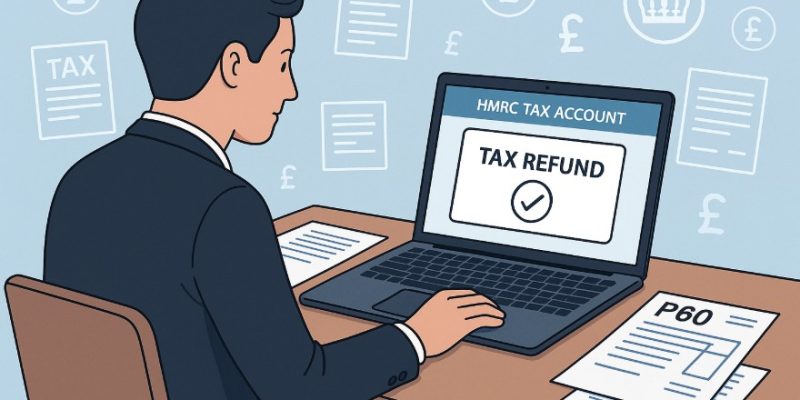
How to Check if HMRC Owes You Money?: A Step-by-Step Guide
Tax matters can often feel complex and daunting, but the good news is that you might be owed money by HM Revenue and Customs (HMRC) without even knowing it.
Whether due to an overpayment, a tax code error, or a change in employment, many UK taxpayers are eligible for a refund.
This guide explains how to check if HMRC owes you money and what steps to take to claim it.
How Do You Check Your Income Tax Online Using Your Personal Tax Account?
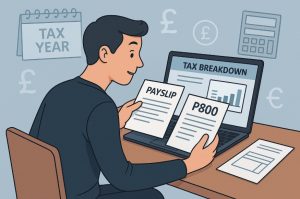
To verify if you are due a refund, use the HMRC Personal Tax Account. This online portal gives access to all tax-related information in one place.
Here’s how to check:
- Visit the official HMRC portal at gov.uk and select the Personal Tax Account section
- Sign in using your Government Gateway credentials or create an account if you don’t have one
- Verify your identity using documentation such as your passport or driving licence
- Access your income tax records for the current and previous tax years
- Look for any notifications or refund messages from HMRC
Once logged in, you can also correct your address, update job details, and track any refund progress.
What Are The Common Reasons HMRC Might Owe You Money?
There are a number of scenarios where HMRC may owe you money, often due to overpayment of income tax or miscalculations related to your employment or financial circumstances.
Understanding these common reasons can help you identify whether you’re eligible for a refund and take steps to claim it promptly.
1. Overpaid PAYE Tax
Pay As You Earn (PAYE) is the system through which most employees pay their income tax directly from their salary.
Overpayments under PAYE can occur if your employer submits incorrect figures or if your income changes significantly during the year. This can happen in situations where:
- You start or leave a job partway through the tax year
- You have multiple jobs and your tax-free personal allowance isn’t properly allocated
- You receive sick pay, maternity pay, or go on unpaid leave, which reduces your taxable earnings
In such cases, your actual earnings for the year may be lower than estimated, meaning you paid more tax than necessary.
2. Use Of Emergency Tax Codes
Emergency tax codes are applied when HMRC doesn’t have enough information to assign the correct code, often after you’ve started a new job.
These codes usually result in higher tax deductions until your correct tax code is issued.
Common emergency tax codes include 1257L W1, 1257L M1, or BR. If you were placed on one of these codes temporarily, you may have paid more tax than you should have.
Once HMRC has the right information, your tax code is corrected, and you’re likely to be due a refund.
3. Multiple Jobs Or Job Changes
If you switch employers during the tax year or have more than one job at a time, it can lead to incorrect tax deductions.
HMRC might not have up-to-date records of your employment status, which could cause them to tax both jobs as if they’re your primary income.
In these cases:
- Your personal allowance may be applied incorrectly across both jobs
- HMRC may calculate your income as being higher than it is
- You might miss out on tax relief that you’re entitled to
Job changes also impact your final paycheck, which may be taxed differently than regular pay periods, especially when you receive a lump sum.
4. Unclaimed Tax Relief On Work-Related Expenses
Many employees are eligible to claim tax relief for costs related to their job. If you didn’t submit claims for allowable expenses, you may be entitled to a refund.
Examples of claimable expenses include:
- Uniform and work clothing maintenance
- Tools and equipment necessary for your job
- Professional subscriptions or trade union fees
- Mileage and travel costs for work-related journeys (excluding your regular commute)
If you’ve never claimed these before, HMRC allows you to backdate claims for up to four years, which could result in a substantial refund.
5. Student Loan Overpayments
If you’ve repaid your student loan in full but your employer continues to make deductions, HMRC may collect more than required.
This often happens when there’s a delay in communication between the Student Loans Company (SLC) and HMRC.
If you’ve overpaid, the SLC or HMRC will issue a refund upon request. It’s important to check your payslips and contact them if the loan balance has already been cleared but deductions are still occurring.
6. Retirement, Redundancy, Or Going On Leave
When leaving a job due to retirement, redundancy, or going on extended leave, your final payment could be taxed incorrectly, particularly if:
- You receive a redundancy payout and it’s partially tax-free
- You leave early in the tax year, but HMRC assumes you’ll continue to earn throughout the year
- You go on unpaid leave and your tax deductions don’t adjust accordingly
Since PAYE works on the assumption of consistent annual income, early departure or pay reductions can lead to overpayments.
7. Tax Code Errors Or Late Updates
Tax codes are used by employers to calculate how much tax to deduct. If your tax code is wrong due to outdated or missing information, you could end up overpaying.
Common causes of incorrect tax codes include:
- Changes in employment not being reported promptly
- Starting to receive a second income or pension
- Employer errors in reporting to HMRC
- Benefits or expenses affecting taxable income not being included
You can check your current tax code on your payslip or in your HMRC Personal Tax Account. If it’s incorrect, updating it may trigger a refund.
How Can You Find Out If You Overpaid Income Tax?
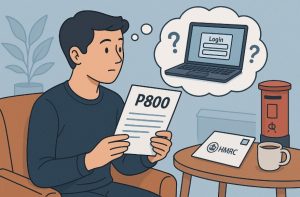
HMRC carries out automatic reviews each year between June and November. If the system identifies an overpayment, a letter known as a P800 will be sent to you. You can also take the initiative by checking the following:
- Your current and past tax codes to ensure they’re accurate
- Your gross annual income and total tax paid
- Your payslips and P60 forms for mismatches in PAYE deductions
- Your online Personal Tax Account for refund alerts
Using the Personal Tax Account, you can see exactly how much tax you’ve paid for each financial year and compare that to what you were supposed to pay.
What Is A P800 Tax Calculation And How Does It Work
A P800 tax calculation is a notice issued by HMRC when they identify that you’ve overpaid or underpaid income tax. It’s not sent to everyone, only to those whose income details do not match expected tax contributions.
P800 letters typically arrive between June and November and include the following:
- A breakdown of your total income from employment or pensions
- Tax already paid under PAYE
- Tax owed or due for refund
- Instructions to claim your refund online if applicable
It’s important to note that if you’re under Self Assessment, you won’t receive a P800, and your refund must be claimed through your tax return.
Can You Still Check If HMRC Owes You Money Without Logging In?
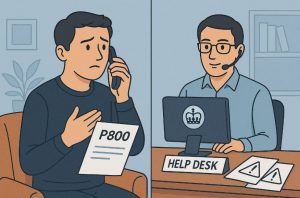
If you are unable to log in or don’t want to create an account, there are limited ways to check if HMRC owes you a refund.
- Use HMRC’s Income Tax Estimator Tool to get an estimate for previous years
- Wait for a P800 letter, which will be sent by post if applicable
- Review your paper payslips and compare them to tax thresholds for your income band
However, you will still need to use your Personal Tax Account to officially claim any refund in most cases.
What Should You Do If You’re Self-Employed Or Under Self Assessment
If you are registered for Self Assessment, you are responsible for calculating your own tax liability. HMRC does not send P800 letters to taxpayers under this scheme.
- When you submit your annual return, HMRC will compare the tax due with what you have already paid
- If you overpaid, the excess will be refunded after the return is processed
- Refunds usually take around five working days from the date of processing
You can track the refund and payment status through your Self Assessment account.
How Do You Claim A Tax Refund If You’re Owed Money?
Once you have confirmation via a P800 letter or from your online account that you are owed money, you can claim your refund by following these steps:
- Log into your Personal Tax Account
- Navigate to the refund section and enter your bank account details
- Confirm and submit your claim online
Most refunds are processed within 5 to 10 working days. Keep an eye on your email or online account messages for updates from HMRC.
When Should You Contact HMRC Directly For Help?
While most tax issues can be resolved online, there are circumstances where you may need to contact HMRC directly:
- If you cannot create or access a Personal Tax Account
- If your P800 calculation appears incorrect
- If you don’t receive your refund within the expected timeframe
- If you need to reclaim tax for years outside the system’s digital reach
You can contact HMRC by phone or post, but ensure you have your National Insurance number and any supporting documents ready.
What Are The Deadlines And Eligibility Rules For Claiming Tax Refunds
There is a strict four-year window to claim any tax refund. This means if you overpaid tax in the 2020/21 tax year, you must submit your claim by 5 April 2025.
Here’s a table outlining claim deadlines:
| Tax Year | Last Date To Claim |
| 2020/21 | 5 April 2025 |
| 2021/22 | 5 April 2026 |
| 2022/23 | 5 April 2027 |
| 2023/24 | 5 April 2028 |
Eligibility depends on:
- Being a UK taxpayer
- Having overpaid income tax through PAYE or Self Assessment
- Possessing relevant documents (e.g., P60, payslips, or expense receipts)
- Not having already received a refund for that period
Claims made after this deadline are typically rejected unless there are exceptional circumstances.
Can HMRC Offset A Refund Against Tax You Owe?
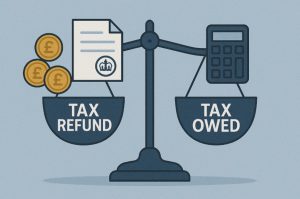
In certain cases, if you are due a tax refund but owe HMRC for another tax year or other liabilities, the amount may be reduced.
For example:
| Refund Amount | Outstanding Tax | Final Refund Paid |
| £800 | £200 | £600 |
| £500 | £0 | £500 |
| £700 | £700 | £0 |
HMRC will notify you if this happens and explain how the refund was adjusted. If you disagree with the calculation, you have the right to request a review or appeal.
Conclusion
Tax refunds from HMRC are more common than people think, and checking your eligibility is straightforward.
Whether through overpayments or unexpected changes, staying proactive ensures you don’t miss out on money rightfully owed to you.
Use the Personal Tax Account whenever possible, understand your tax code, and reach out to HMRC if anything seems unclear. Refunds are time-sensitive, so don’t delay.
Frequently Asked Questions
Can I get a tax refund automatically from HMRC?
Yes, HMRC will automatically issue refunds if they determine you’ve overpaid, usually through a P800 notice.
What documents should I keep for tax refund purposes?
Keep payslips, P60s, P45s, receipts for work expenses, and any P800 letters received from HMRC.
Is it possible to get a refund from more than one tax year?
Yes, but you must claim within four years of the relevant tax year.
Do tax refunds affect benefits or Universal Credit?
Generally, no. Tax refunds are not considered income for benefits purposes.
What happens if I ignore a P800 letter?
You could miss your chance to claim the refund. It’s important to act promptly.
Can I claim tax refund if I’ve left the UK?
Yes, you can still claim a refund by submitting a P85 form and providing proof of overseas residence.
What if I made a mistake in my claim?
You should contact HMRC immediately. They can help amend your return or adjust the claim.




